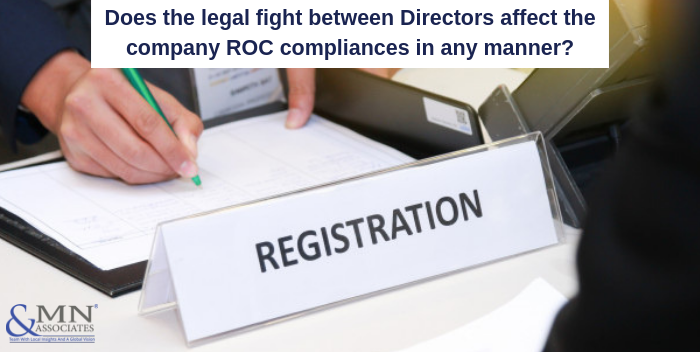
Does the legal fight between directors affect the company ROC compliances in any manner?
Directors play a very crucial role in the functioning and success of any company. They are the agents, trustees or representatives and act on behalf of a company in a fiduciary capacity. Along with that their acts and deeds have to be exercised for the benefit of the company. To the extent the powers of the directors are delineated in the Memorandum and Articles of Association of the company, they are bound to act accordingly. As agents of the company, they must act within the scope of their authority. All the directors ought to disclose that they are acting on behalf of the company. The fiduciary capacity within which the directors have to act enjoins upon them a duty to act on behalf of a company. The Directors should perform their duties with the utmost good faith, care, skills, and due diligence. The duties performed should always be in the interest of the company they represent. They have a duty to make full and honest disclosure to the shareholders regarding all important matters relating to the company.
In view of the powers conferred on directors and the reality of functioning of a company, disputes arise when trust among the directors is lost. It is noticed or exposed through appointment and removal of directors in the company. A dispute may also arise among directors if any of them makes an illegal exercise of their power. Also along with that do not discharge their functions effectively in the interest of the company. All this definitely affect the company ROC compliances as removal and appointment of directors takes place. Followed by this then makes form filing necessary. A dispute between directors could be even more difficult to manage when the director in question is a shareholder. A dispute redressal mechanism should be set up by the company where such disputes may be resolved in the best possible manner.
When does the matter come to court?
If the directors keep on fighting and dispute becomes irrevocable, then the matter comes to the Court. The aggrieved director can either approach a Civil Court, Company Court on just and equitable clause or can even approach the Company Law Board. CLB may not look into the procedural irregularities at times in view of other facts. But CLB may look into the technicalities strictly at times. Despite the prevalent majority rule, the CLB may appoint someone as the director even against the wish and will of majority shareholders in the Company. A director can resign or be removed by members or shareholders at any time providing such actions do not contravene any provisions in the Companies Act, the articles of association or a director’s service contract.
Terms when a Director intends to resign
Moving to the compliances, the director who intends to resigns shall send a notice in writing to the company. The Director must intimate the ROC for the same by filing Form DIR-11. However, MCA vides its notification dated 07.05.2018, have made the filing of DIR-11 optional in the hands of the resigning director. The Directors are recommended to file DIR-11 for disputed matters. It is also the duty of the company to intimate the Registrar about the said resignation. The intimation is done filing form DIR-12 within 30 days of the date of resignation along with the prescribed filing fees. The company shall comply with Section 168 and Rules thereunder. In addition to it, Section 175 (and Secretarial Standard SS-7 if the noting is done by way circular resolution) where a managing director or whole-time director resigns, then notice of resignation must be done in the duly convened board meeting as per SS-7.
Not only such disputes affect the company ROC compliances but also the image and goodwill of the company. These matters cannot be kept hidden in the corporate world. Sooner or later people come to know about these things which then affect the company in turn. So it is advisable for the management to be at precaution.
